Metamimesis as co-knowing and co-making
Metamimesis refers to the ancient category of mimesis (Halliwell), modified to account for the modern tendencies stemming from Romanticism (Pirholt). The inherent criteria of metamimesis were determined by A. Elias, who analyzed the British literary works in the context of the category of fiction with emphasis on how postmodern tendencies impact realism in the anglo-american literature. Following Martin and Jakobson she listed the features of realism which – since the time of Victorian Realism – were the material of artistic experiments and embraced the idea of self-aware reflexivity (Levine). The transformation of mimesis (from ‘epistemological dominant’ into ‘ontological dominant’) – specifically of the meanings – led Elias to rename it as ‘metamimesis’. She argues that mimesis is hybrid and paradoxical in nature.
Baz Kershaw located the paradoxes of mimesis in the performing arts in the ontological-epistemological interplay of ‘making’ and ‘knowing’. He described metamimesis as „the transport of illusion sublimely beyond the production of ‘reality effects’”, interactions between the initiators of performance, participants and reality. Defects of the quality of metamimesis constitute the necessary element of forming a new kind of being (analogously – ‘metaperformance’). Is the aim of the new performance the awareness of truth? Experiencing the illusion of art as making-knowing is tantamount to power (comparable with the ancient catharsis; Lear, Nussbaum)?
Metamimesis is realized in recent art – accordingly, to different degree – as a technique of artistic actions (poiesis) and the theoretical category (theoria), the synthesis or hybrid combination thereof. I attempt to delineate the possible criteria of the performing arts. The material for my analysis of the functionality of the category metamimesis on different levels and dimensions is Xavier le Roy’s „Low pieces”.
Anna Kawalec is an adjunct professor at the Chair of Theory of Culture and Art, John Paul II Catholic University of Lublin (Poland). Received her M.A. in Polish philology, specializing in the history and theory of theatre, and her Ph.D. in philosophy (the dissertation – in Polish – titled Theatre as a personal sign of human being was written at the seminar on philosophy of God and religion). She was a high school teacher, managed authorial youth theatre “Dziung’s Theatre” (developing a version of Michail Checkhov’s method). She contributed to research on anthropological and ethical personalism in the Institute of John Paul II (Lublin). Was a visiting fellow in The Theatre Faculty of the Academy of Performing Arts (DAMU in Prague). Her papers and organized conferences focus on philosophy of art, theatre and performance; she edited On the notion of art in contemporary culture (in Polish; Lublin 2010) and Between authenticity and pretending. Creative attitudes in contemporary culture (in Polish; Lublin 2013). Membership: the Performance Philosophy; TaPRA; the European Society for Aesthetics; the Polish Aesthetics Society. Member of the editorial board of “Annals of Culture Studies” (Lublin).

